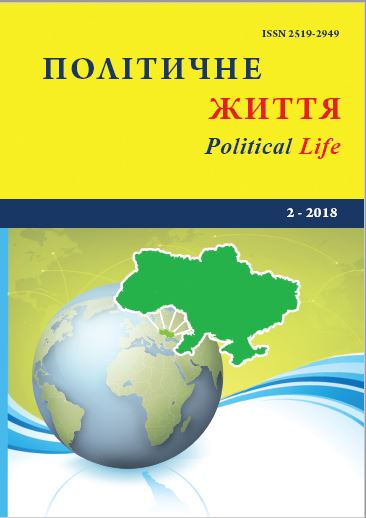Post-conflict management practices in the economic policy.
DOI:
https://doi.org/10.31558/2519-2949.2018.2.9Keywords:
post-conflict management policy, post-conflict economy, reconciliationAbstract
Specific features, connected with the influence of past conflict, characterize economic situation in the post-conflict area. It is these features that make it possible to characterize post-conflict management as a separate political and legal category. These specificities should determine the activities of actors to achieve the goal of post-conflict policy.
The article defines the characteristics of post-conflict social relations, examines the problems of the functioning of the post-conflict economy, and presents concrete management practices – examples from various post-conflict countries of the world – that solve these problems. The economic recovery of post-conflict areas is considered from the point of view of the psychological state and needs of individuals living in such territories. It is revealed that decisions and actions in the economic policy oriented on the individual can contribute to the achievement of reconciliation in society and prevent return to the state of conflict because of the formation of conditions that will make peace more economically profitable for different segments of the population. The informal institutions that are an integral part of the post-conflict economy are described, and the decisions and actions are showed that make it possible to level the influence of such institutes on social relations through various forms of motivating the population to transfer their activities to the legal plane. Management practices are presented that can create further prerequisites for the sustainable development of post-conflict areas, taking into account the phenomenon of "post-conflict growth" of individuals.
The description of the risks that may arise before the actors of the political process is given, and the possible ways of overcoming them are described. International technical assistance is considered as an important tool for the recovery of the post-conflict economy. The advantages and disadvantages of processes related to obtaining international technical assistance are analyzed, in particular, the risk of donors’ interventions in management processes. Models are proposed for preventing such an interventions.
References
Чаплыгина И.Г. «Экономический человек» Дж.С.Милл и Адама Смита: методологический аспект. // Научные исследования экономического факультета. Электронный журнал. [Електроний ресурс] – С. 15–20. – Режим доступу – https://archive.econ.msu.ru/sys/raw.php?o=3642&p=attachment
Швери Рольф Теория раціонального выбора: аналитический обор [Електронний ресурс] – Режим доступу до ресурсу: http://jour.isras.ru/upload/journals/1/articles/161/submission/original/161-301-1-SM.pdf.
Coyne С. J. Reconstruction and Reconciliation: What’s Economics Got to Do With It?. // The Whitehead Journal of Diplomacy and International Relations. – 2017. – pp. 69–83.
Post-Conflict Economic recovery Enabling Local Ingenuity [Електронний ресурс] – Режим доступу до ресурсу: http://www.undp.org/content/dam/undp/library/crisis%20prevention/undp-cpr-post-conflict-economicrecovery-enable-local-ingenuity-report-2008.pdf
Титаренко Т.М. Особистість перед викликами війни: психологічні наслідки травматизації // Проблеми політичної психології. – 2017. – Випуск 5 (19). – С. 3–9.
Wicks L. Rwanda ‘s Miracle: From Genocide and Poverty to Peace and Economic Prosperity [Електронний ресурс] / Laura Wicks // Florida International University FIU Digital Commons. – 2014. – Режим доступу до ресурсу: http://digitalcommons.fiu.edu/cgi/viewcontent.cgi?article=2614&context=etd
United Nations Transitional Authority in EasternSlavonia, Baranja and Western Sirmium: archived web-site [Електронний ресурс] – Режим доступу до ресурсу: https://peacekeeping.un.org/mission/past/untaes.htm.
Murell P. The Transition According to Cambridge, Mass.. // Journal of Economic Literature. – 1995. – № 33. – pp. 164–178.
Disarmament, Demobilization, Reinsertion & Reintegration: Actors & Activities [Електронний ресурс] – Режим доступу до ресурсу: http://www.peacebuildinginitiative.org/index631d.html?pageId=1820#the-differentways-of-administering-disarmament.
Boothby D. The UNTAES Experience: Weapons buy-back in Eastern Slavonia, Baranja and Western Sirmium / Derek Boothby // Bonn International Centre for Conversion. – 1998. – Brief 12. – p.37.
Boothby D. The Political Challenges of Administering Eastern Slavonia / Derek Boothby // Global Governance. – 2004. – Vol. 10, No. 1 – 2004. – pp. 37-51.
Україна Оцінка відновлення та розбудови миру Аналіз впливу кризи та потреб на східній Україні [Електронний ресурс] – Режим доступу до ресурсу: http://www.un.org.ua/images/RPA_V1_Ukr.pdf
Schmidtchen D. To Help or not to Help: The Samaritan’s Dilemma Revisited. // CSLE Discussion Paper. – 1999. – pp. 1–14.

